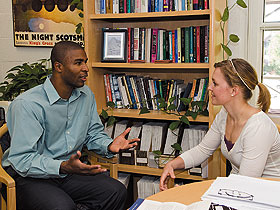  |
| HOME | THIS ISSUE | CALENDAR | GRANTS | BACK ISSUES | < BACK | NEXT > |
UCompass program reaches out to students who get into trouble by Richard Veilleux - September 22, 2008 | ||||
| Michael had made a mistake. He’d been caught with marijuana on campus. When he trudged toward the Office of Community Standards, he expected the worst. What he didn’t know was that there was a program that could help him. Michael (not his real name) went from being another discipline statistic to being another success story for UCompass, a program started in fall 2006 by the Office of Community Standards. UCompass reaches out to students who have made a mistake, such as underage drinking, vandalism, or creating a nuisance; talks to them one-on-one; and gets them involved in campus activities so they’re less likely to do it again. “They gave me a slap in the head in the right direction,” says Michael, who is now involved in dance organizations on campus and is going to the gym more often. “I love the program and its foundations. They helped me reflect on what I did, the path I was heading, and the kids I was hanging out with. I was going in the wrong direction.” Michael is one of more than 660 students who have been helped by UCompass since the fall of 2006, when it started as a small pilot program. Most of the students have participated in UCompass since last fall, when the office decided the program was a winner. “A lot of people think we work with bad people,” says Lee Williams, dean of students. “They’re not. They’re students who made a bad choice, and we like to help them get back on course.” Williams says the name of the program reflects this, because the “moral compass” of most of the students involved has gone askew. It’s not that they have no sense of rights and wrong, she says: “This program tries to get their moral compass pointing in the right direction.” The program, say Williams and Cathy Cocks, director of community standards, focuses on freshmen and sophomores who come to their attention, usually for minor offenses. Often, they say, these students were academically solid and were involved in a range of activities while in high school but, for whatever reason, drifted once they arrived in Storrs. “A lot of them were leaders in high school,” says Cinnamon Adams, a community standards specialist. “Then they come here and don’t get involved. They’re taking a break. They feel UConn is too big and it rattles them. Maybe they were athletes in high school but can’t make the team in a Division I program. “So they make a choice that brings them to our office. With this program, we’re giving them some focus, bringing them back,” she says. Cocks says research clearly indicates that the more involved students are, the more pride they take in their university and the less likely they are to make a misstep.
So Cocks, Adams, and Donta Johnson, assistant director of community standards, joined by a graduate assistant and four practicum students in the higher education student affairs graduate program, work with the students who appear before them. They try to ascertain what the students enjoy doing, what niche they fit into, and then, working closely with the Department of Student Activities, find something each student may be interested in. Many of the students are amazed when they discover how many organizations and activities there are on campus. Adams says the program has three components: an academic focus, which could be anything from meeting with their advisor to attending a lecture; a long-term commitment to a club or organization and, if they’re already involved, seeking a leadership role; and a journal the students must keep, writing about each experience they have, with a final entry discussing the program – what they liked, what didn’t they like, and whether they will continue in the organization they joined. The program also has a component that works with students who were suspended. “We want them to come back to UConn,” says Williams. “If we didn’t, we would have expelled them.” Now, when a student is going to be suspended, he or she is assigned to a community standards staff member. The staff person keeps in touch with the students during the suspension, with a phone call or e-mail to see how they are and a reminder about their return date and what they have to do to get back. That aspect of the program also seems to be working. Since the program started, the return rate of suspended students has increased from 49 percent to 61 percent. “A lot of what we’re doing will help with student retention, and it will also help improve the quality of student life,” says Cocks. Neither she nor Williams is aware of a similar program at another university. “People make mistakes,” says Cocks. “They’re headed to a fork in the road, and we want to be at that fork with them. If we can get them involved in the community after that first mistake, hopefully we can ensure they don’t make a second or third mistake.” |
| ADVANCE HOME UCONN HOME |

